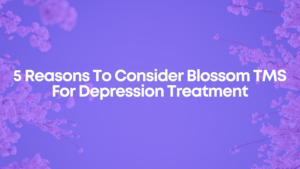Transcranial magnetic stimulation (TMS) is a non-invasive brain stimulation technique that uses magnetic fields to stimulate nerve cells in the brain. TMS has been shown to be effective in treating depression and other mental health conditions. While TMS treatment alone can provide significant relief from symptoms, making certain lifestyle changes can help maximize and prolong its benefits. Here are some recommendations for lifestyle changes to get the most out of TMS therapy, and to maximize TMS benefits:
Sleep: Prioritize getting 7-9 hours of quality sleep per night. Sleep is essential for overall brain health and function. TMS improves communication between brain regions, and adequate sleep gives your brain the restoration it needs to solidify these new connections. Develop good sleep habits like limiting screen time before bed, keeping the room dark and cool, and going to bed and waking up at consistent times.
Exercise: Engage in regular cardiovascular exercise like walking, jogging, cycling, or swimming for at least 30 minutes per day, 3-5 times per week. Exercise stimulates nerve cell growth and releases endorphins, which enhance mood. It also improves circulation and oxygenation, which optimizes brain cell health. Aerobic exercise is especially helpful for potentiating the effects of TMS on the prefrontal cortex.
Nutrition: Eat a balanced, nutritious diet high in fruits, vegetables, whole grains, lean proteins, and healthy fats like omega-3s. Deficiencies in nutrients like B vitamins, magnesium, zinc, and iron can exacerbate symptoms of depression. Support brain health and energy levels by avoiding processed foods, sugary snacks, and excessive alcohol or caffeine. Stay hydrated by drinking plenty of water throughout the day.
Stress Management: Make time each day for relaxing activities like meditation, yoga, deep breathing, journaling, or spending time in nature. Chronic stress elevates cortisol and inflammatory markers that can suppress TMS benefits. Learn to manage stress through healthy outlets, minimizing unnecessary anxiety, and taking breaks to reset your mindset. Let go of perfectionist tendencies and negative self-talk that fuel stress.
Social Connection: Surround yourself with a strong support system of family and friends. Loneliness and isolation can make depression worse, while social connection enhances well-being and provides a sense of purpose. Participate in social activities, share your feelings with loved ones, and seek their encouragement to maximize motivation.
Cognitive Stimulation: Engage your brain regularly through activities like learning new skills, playing puzzles or strategy games, reading, making art, or playing musical instruments. Mental stimulation strengthens neural connections and may prolong the effects of TMS. Continue “working out” your brain just as you would exercise your body.
Pleasant Activities: Make time for hobbies and activities you enjoy, even if you don’t feel like it. Pleasant events boost mood by releasing dopamine and serotonergic neurons targeted by TMS. Scheduling rewarding activities can help with motivation and quality of life. Explore new interests that provide meaning or a sense of accomplishment.
Routine: Structure your days with consistent waking, sleeping, eating, and activity times. Daily routines balance productivity with self-care and rest. Maintaining structure and discipline in your lifestyle can maximize adherence to the above suggestions. Use calendars, alarms, and reminders to stay consistent with healthy habits.
Avoid Alcohol and Drugs: Minimize or abstain from alcohol, recreational drugs, and sedatives, which are depressants that can suppress TMS effects. These substances disrupt sleep, impair cognition, and inhibit nerve cell growth factors targeted by TMS. Speak to your doctor about any medications or supplements that could interact with TMS treatment.
Ongoing Care: Continue psychotherapy, medication management, support groups, or other mental health treatment in conjunction with TMS. Ongoing care provides guidance on lifestyle changes while helping you process psychological barriers to improvement. Regularly monitor your mood and progress with your treatment team.
TMS is not a quick fix but rather activates lasting changes in brain connectivity that require maintenance through healthy lifestyle habits. Committing to the structures and self-care practices outlined above can help you sustain the benefits of TMS over the long term. Discuss any concerns with your doctor and seek support from loved ones to make lasting lifestyle changes. With dedication to your wellbeing, TMS can have a profound positive impact on your mental health.
PsyFi TMS offers cutting-edge TMS therapy utilizing the latest techniques and equipment. Our experienced team can provide TMS treatment tailored to your unique needs. Contact PsyFi TMS today at info@psyfitims.com to see if TMS therapy is right for you and how you can maximize TMS benefits with lifestyle changes.



I find it surprising that you can use TMS to improve your overall mood and treat the effects of depression. My colleague suspects that his sister has this illness since she suddenly lost interest in everything for no reason. I should talk to them about finding a TMS expert that can help with this someday.